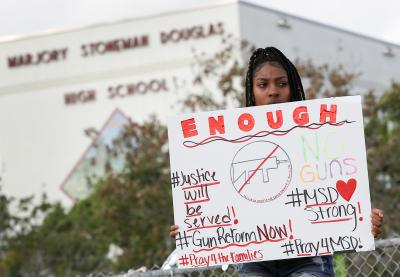One year ago this Thursday—beginning at 2:21 p.m. in Parkland, Florida—a young man with a gun killed 17 students and educators at Marjory Stoneman Douglas High School. He wounded 17 more, but no number can do justice to the damage done. Not counted are those who witnessed the deaths of their classmates and friends. Not counted are those for whom a school will never feel safe again.
It’s an anniversary we mark with solemnity. It’s a day of reflection—a day in which we will remember each victim of school gun violence and vow to never forget. But it’s also a moment when we can honor those who stood up when it would have been understandable for them to give up—students and families who looked to their civic leaders, their communities and their broken laws and said, steadfastly, #NeverAgain.
The past year has reminded us of a historic, recurring truth: Our young people have the capacity not only to demand change but to bring it to fruition. They are not just our consciences and guides but, often, our trailblazers. In the face of accusations that they were too young, too naive and too quick to demand justice rather than mourn silently, the kids behind #NeverAgain, #MarchForOurLives and local movements across the country made great strides this year. We saw not only the strength of Parkland survivors but also, the recognition of many youth activists of color who had been working to stop gun violence in their communities for years.
This past year, we watched as students walked out of school to demand better laws. We watched as more than 200,000 people attended the March For Our Lives in Washington, D.C., and hundreds of thousands more joined them in 800 locations across the United States. We watched and watched and watched as Emma González held her moment of silence for six minutes and 20 seconds, never breaking in her resolve or strength. We watched as these students worked toward a future where more young people wouldn’t have to mobilize their grief to join them in this fight.
At Teaching Tolerance, we met students who inspired us to deepen our commitment to promoting student action. Like Alex King, from Chicago, who told us, “I do this work because I am focused on more than just me. I’m focusing on the next generation.” Like Mary Cox, from Marshall County, Kentucky, who said, “Complacency is a sickness of the human spirit.” Like Marco Vargas, from South Central Los Angeles, who affirmed, “A lot of people are saying that it may just be a moment, but it’s not just that. It’s about turning it into a movement.” Like Jenna Bowker, from Kalamazoo, Michigan, who insisted, “This time, we’re not going to let it fade away.”
And they haven’t. In the last year, young people haven’t just made demands; they’ve made change. Florida lawmakers passed the state’s first (albeit, imperfect) gun control measure in more than two decades. In Washington state, 60 percent of voters supported a law to regulate semi-automatic rifles. Twenty-five other states passed gun safety laws in 2018.
The #MarchForOurLives movement reached beyond demanding better of their current leaders, reminding young people of their power to shift that leadership through voting and voting advocacy. They sparked a voter registration spike across the United States as they embarked on a bus tour called the “Road to Change.” And change occurred. Nationwide, youth turnout increased by 10 percent.
When we were privileged to meet student activists from Marjory Stoneman Douglas High and other schools this past summer, they reminded us of an educator’s role in shaping the change makers of tomorrow. They expressed the importance of giving students the tools to navigate our civic systems and believing in students’ capability to understand and act on complex issues. We were blown away by the clarity of their mission, but we shouldn’t have been.
From the Children’s March in Birmingham to the anti-Vietnam War movement, from the Dream Defenders to the Water Protectors, we have always asked educators to celebrate and teach the power of young voices.
Today, we ask it again. We hope that, on this anniversary, not only will we never forget and remember the demand of “never again”; we hope that we will never stop. That we will never stop giving young students the opportunity to strengthen their voices so they can lead. Remember the students and educators we have lost. Remember the power of our youth. And remember that the march for their lives continues.
Collins is the senior writer for Teaching Tolerance.
